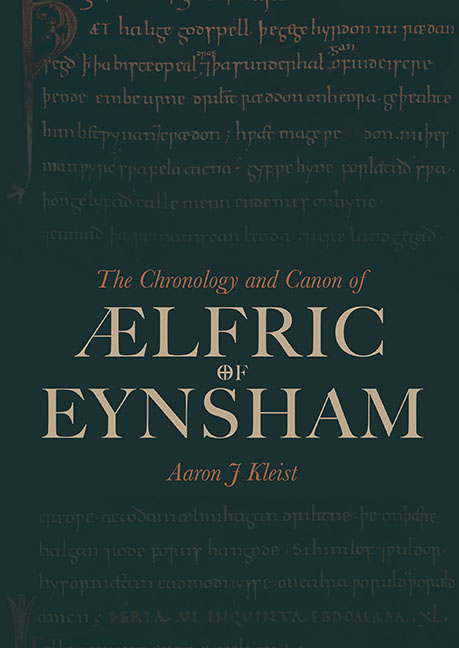Appendix 4: The Chronology of Ælfric's Works: Compendium
Published online by Cambridge University Press: 15 October 2019
Summary
The information in Appendix 4 might more precisely be titled ‘A Snapshop of Current Scholarship Regarding the Chronology of Ælfric's Works’, for that is what it seeks to encapsulate: the array of analytical conclusions, hypotheses, and tenuous suggestions (whether mine or others’) that have been posited about items in Ælfric's corpus. Caution, however, should be taken with the results. Though the timetable seems to give a blow-by-blow account, tracing Ælfric's authorial and editorial activity down to the year or month, the whole rests on deductions rather than certainties. We can't say definitively that Ælfric initially completed CH I in 989. We can't categorically affirm that he initially completed CH II between the first half of 991 and the first half of 992. Our dates for the elevation of Wulfsige III, the death of Ealdorman Æthelweard and the elevation of Wulfstan the Homilist are reasonable but not absolute. Ælfric's elevation as abbot seems to have occurred later in the period 1002 x 16 November 1005, but future scholars may bring us greater clarity. Cenwulf's tenure and the elevation of Æthelwold II may both fall between 16 November 1006 and 1007, but on the matter again we cannot be unequivocal. The years since Clemoes’ ‘Chronology’ have moved our understanding of these milestones, and the dating of swaths of Ælfrician works are directly affected as a result.
But not much. The last six decades of scholarship may have added some possible items to Ælfric's canon, enriched our knowledge of his sources and compositional methods, and given us greater access to manuscript images and textual editions, but they have tweaked Clemoes’ key dates by only a few years at the most – and sometimes, not at all. Further revision is no doubt yet to come: at best, this study may offer a resetting of the clock, a basis for new discussions that could challenge this timetable and show certain of its presuppositions to be baseless. At the same time, however, it is not impossible to imagine sixty and more years hence a chronology being accepted whose contours are not unfamiliar, reflecting still the pioneering work of Clemoes, Godden, Pope, and others who came before.
- Type
- Chapter
- Information
- The Chronology and Canon of Ælfric of Eynsham , pp. 276 - 308Publisher: Boydell & BrewerPrint publication year: 2019



